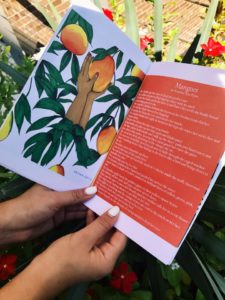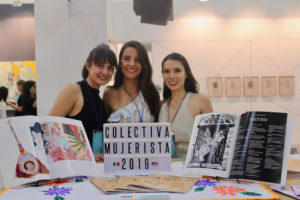The Mujeristas Collective is an art collective and platform for the voices of Latinas and women of color based in Queens, NY. The Feminist Book Club is excited to be supporting this September. The Collective publishes zines showcasing contemporary art and writings from women around the world, and hold community events centering on Mujerismo and art. We interviewed Stephanie Aliaga, Founder and Executive Director, and Denisse Juliana, Content Producer, to know what motivates the organization, their goals, successes, challenges, and the importance of documenting their stories.
Rashmila Maiti: “Mujerista” was introduced by Ada Maria Isasi-Díaz, an activist-theologian involved in the feminist theological movement. Womanism, an ideology originating with Alice Walker, inspired Isasi-Díaz to construct a new framework, and identity, to aid Latinas in their fight for liberation from oppressive social structures. Can you tell us something about how your organization exemplifies “Mujerista” and Womanism?
Stephanie Aliaga: Yes, Ada Maria Díaz founded Mujerismo or Latin American feminism and she was inspired by Alice Walker and other Black feminists. And we expand Díaz’s platform at the Mujeristas Collective. ‘Mujerista’ translates to ‘Womanist’ in English and is an identity. Mujerismo is a platform that gives Latinas a voice and shares their own experiences. And our platform for women of color and Latinas help to showcase their work, through artwork and writings, based on themes that we put out. We compile them into a zine and then we showcase it at art shows, art fairs, museums, and even school libraries. It is important for us to document these works by first and second-generation Latinas and women of color.
RM: Why do you think it is important to document these narratives?
SA: I think our stories and histories are important to share with the world. I feel all our experiences are very unique but we can have a shared interest or a shared struggle that we can express in our own ways. Especially now, it is critical for our own voices to be heard and documented in schools, museums, libraries, and institutions which should see us and hear what we have to say.
Denisse Juliana: I think it is also important to know that there is plenty of history in our own communities and where we are from. Whatever country you are from, being here in America as a first or second-generation person is a whole different ball game. So, it is important to document those life sharing experiences because we are Latina that has its own culture but we are also creating our own culture here in America. So not fully here, not fully there, but our own thing.
RM: What was the inspiration/driving force behind creating the Mujeristas Collective? You started this organization while at college at St. John’s University in Queens, New York.
SA: I was a junior or sophomore when I was introduced to Mujerista theology in my theology class. We all went to St. John’s University in Queens which required all students to take a theology class. And I was lucky to have Dr. Erin Kidd as my professor; she introduced Mujerista as required reading. And it was the first time that I heard anything that was talking about feminism and God in a different way. I went to a Catholic school my whole life and I had never heard of anything that combined social justice, feminism, religion, into one and it was just mind-blowing. And I could not believe that no one was talking about it.
I was also minoring in Women and Gender Studies where I read works by White feminist writers and Black feminists but we would never talk about Latin American or Asian American feminism. When I learned about Mujerismo, I wanted to learn more. So, I took a Women and Theology class. After I read and researched her work, I was inspired to create this organization, expand her work, and honor her name and what she does. At that time, not many people knew about Mujerista, and now, I think it has become kind of a popular term, at least in the Latinx community I don’t think many people know the history or what the word really means. It was awesome to put a flyer on social media and be like, hey, if anybody wants to join, let me know. And the people who joined are the same who are in this organization. We are close friends, and even though we have graduated and live in different states, somehow, we are still able to have this organization. They are as passionate about it as I am. I am thankful for that.
DJ: I think the driving force that keeps us going now is that we understand what the Mujeristas Collective means to our community, what it is to struggle as an artist in the Latinx community as it is such a taboo career, and it is important for the Collective to give this space to spark social change.
RM: Despite having a theological background, the Collective is not completely religious.
SA: Yes, we are inspired by her ideology, not her theology. We did create a zine about this to go back to the history and roots of this ideology but we didn’t impose Catholicism or Christianity into the theme of the zine; we really wanted people to share their thoughts and expressions on liberation and religion. We are not a religious organization; we are inspired by her ideology. We are passionate about the arts and we created a new element to Mujerista.
DJ: Religion is such an integral part of the Latinx community that we feel it is important to talk about it, question it, and explore it in whatever way members choose to.

RM: The Mujeristas Collective publishes zines showcasing contemporary art and writings from women around the world. Can you tell us why you chose to publish a zine? Also, what has been the response like for your digital zine that is available on your website?
SA: Before I started the Mujersiatas Collective, I was passionate about making zines. I also studied journalism and I thought zines were the coolest thing ever because people could create a book or a pamphlet. And they could showcase in this little thing whatever they wanted to say, any artwork, writing, photographs, or anything else. I started doing that before the Mujersiatas Collective and I didn’t realize that there was a whole zine community in Brooklyn. Through this zine community, I connected with a lot of women of color and Latinas.
I felt there was a lack of space for Latinas so when I was creating the Collective, it made sense to integrate the zines in the organization where this zine is accessible, easy to print, showcase our work, and share with the world. With zines, we don’t need a publisher to tell us what we can and cannot print. We are in charge of what we want to share with the world. These are personal things which we can’t share with our family or friends. So, zines are the way to share our experiences and connect to artists, which is the best thing. Some of these are artists whose works we admire and we are really honored to have their work as a part of our zines.
This was our first time doing a digital zine/virtual exhibition and the response has been really amazing. In the beginning, we had printed works that were important to us and it was fulfilling to physically have something that had our work. In the digital zine, we had over 45 artists who contributed their works. There was no theme with this zine and it was inclusive to men, not exclusive to women of color and the Latinx community. It was a special moment to have during this difficult time. People also donated to our organization which was great. It was a different experience to have something so accessible that anyone on our website can take a look at our work.
RM: What does it mean to be a woman of color, in the present social climate, who is running a non-profit organization for other women of color, especially Latinas?
DJ: We understand what we are doing and what we do comes with a lot of responsibility but at the end of the day, we are also in the process of learning how everything works. It can get overwhelming and it also about sharing our struggles that can be difficult. As a woman of color now, it is important to keep working and producing work but at the same time, we need to be honest and open about our journey.
SA: Our journey is obviously not perfect and the work that we do is not a one-time thing. It is a process to see change and make that happen. Things online can seem easy but it takes a lot of work and energy to create a zine, organize an event, or work in a medium. It is time-consuming and not always, fun. So, it is important to do self-care, focus on yourself, and understand that you don’t have to always be an activist.

RM: What’s your most successful program, either in your community or the zine issues, and why? How have you seen your organization’s work make a difference?
SA: I feel that the youth programs are definitely the most successful, and fulfilling for us. During those programs, we are able to physically give back and connect with the youth because the youth are already learning about who they want to be and discovering different things and their interests. And to be able to tell them who we are and try to inspire them by taking their passion and what they are good at, and do something with it that is positive and make a difference in their community, group of friends, and school groups, is something attainable.
Our programs are mostly focused towards high school students, especially those who have been in Latin America and have recently immigrated here. It is a very different and difficult experience for these students to learn a language, learn about American culture while trying to fit in, and balance everything. So, when they see us do cool things with our culture and share in a really special way, I hope that it inspires them to also do that.
We also received a grant from the Queens Council on the Arts for which we are eternally grateful. The grant helped us sustain our organization. It was really nice to see another organization believe in us, come through, and support us without really meeting us.
RM: What are the biggest challenges that the Mujeristas Collective is facing? What are areas of opportunity for your organization?
DJ: One of our biggest challenges is time as each one of us has our own career and goals outside of Mujeristas. Our biggest challenge has been to balance everything and dedicate the time that the Collective needs. We have ambitious goals and we want to do more programs, especially youth programming, and more zine publishing but as Stephanie was saying, it needs a lot of time and energy. We also want to use art as a way of healing. We want to use art to showcase talent but also to deal with issues and experiences. We also saw healing when we organized the virtual exhibition/digital zine, where people submitted their art and even the little things that they enjoyed doing.
SA: We work with kids in our workshops who had difficult life-experiences and we take that into account with our work. Moreover, we are looking into opportunities and figuring out the future for Mujeristas as we don’t want to let it go. We are also looking into ways of organizing more youth programs, get more funding through grants, organize more community projects, and publish more zines in the future.
RM: What would make the greatest difference in helping the Mujeristas Collective get better at what it does?
DJ: Funding. When we get funding, we are able to organize events and workshops. We don’t want the participants to bring materials to the workshops; instead, we would like to provide them. One of the reasons we did the digital zine, was COVID-19, and to save on money.
RM: How do you work with other organizations/peers who address similar issues? How do you mobilize others around your mission?
SA: We partner with women of color, artists, and organizations, collectives, and anyone who we feel really understands our mission and aligns with our goals. We have collaborated in the past. I was really inspired by the drive that I saw in the Long Island non-profit, where I worked, and I would like to bring that to the Collective, youth programs, and community building. So, when we collaborate with schools, libraries, or museums, it is nice to connect with the organizers and for the youth to have a showcase and give an opportunity to share our work with them.
DJ: We also want to inspire our own members and the students who try to make a change, even on a small scale.
RM: What advice would you give to someone who is young, Latina, and wants to change the world?
DJ: Something that someone told me that I still think about is: have a really deep conversation with yourself, and understand and know what it is that you are trying to do. It is something that you constantly work on; it is not a one-time thing. It is important to know what it is that makes you happy, what are you trying to do, and who are you trying to serve. If you can answer those three and those are related, then you are on the right path. It doesn’t have to be a revolution; it can be something small, like inspiring your neighbor or talking about difficult things. Small changes build up.
I would also like to stress the importance of self-care because as Latinas, we tend to carry so much responsibility on our shoulders and expectations are so high. We have to take care of ourselves instead of fighting through life.
SA: When I became more involved in creating Mujeristas, and also had a feminist organization in college, that was the first time that I really took the initiative for leadership and wanted to make a difference in where I was in my environment. My advice would be to just push yourself and if you are really passionate, want to do something, and see something lacking in your community, then push yourself to do it. Push away the fears that you have and the judgment that you think people will put on you, and just go for it. You would be surprised to see what happens when you hone your craft. It will grow and the work and time that you put in will pay off. Somebody will notice and acknowledge your work.
RM: How can I get more involved?
SA: We are always trying to create opportunities to connect with other people and get involved in our organization. We want people to know about what we do. We are only an email away and if anyone wants to volunteer with us, are passionate about journalism or photography or marketing or something else, or have an idea or want to contribute, or we can do better, or create something, then we are so open to ideas. We are inclusive that we definitely want to hear what people want to see in our community and organization. We are also open to ideas and themes for our zines, be it virtual or physical. If someone wants to write a blog post or create a virtual experience, then that would be cool. I would love to see that. Now, we have a cooking series on Instagram which is open to recipes. And people can follow us on social media, look at our website, or subscribe to our newsletter. They can read a free PDF that we can email. We want to be as accessible as possible.


